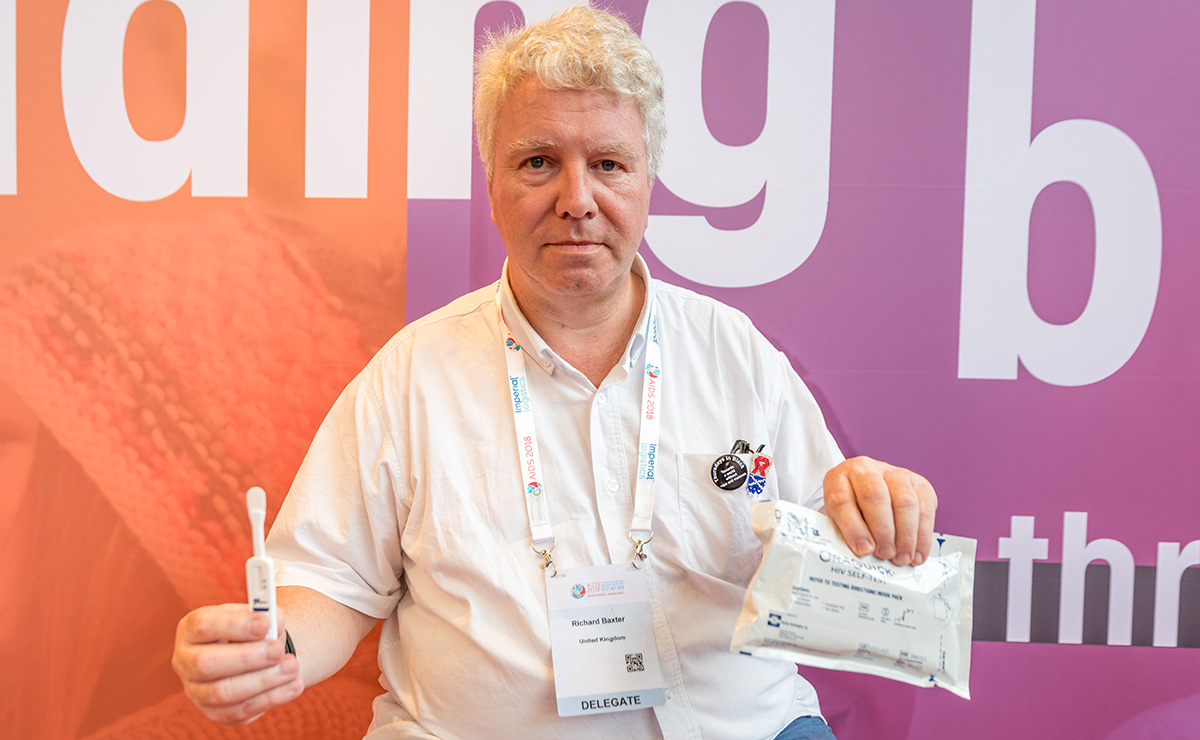Kirk minister takes HIV test in stigma busting move
Published on 6 August 2018
A Highland church minister took an HIV test to highlight the need to overcome stigma as a barrier to saving lives.

Rev Richard Baxter said the self-testing kit, which has been made available in parts of Africa including Malawi, could help stop new infections and unnecessary deaths.
The minister, who leads Fort William: Duncansburgh MacIntosh and Kilmonivaig churches, used the mouth swab system at the AIDS2018 conference in Amsterdam last month.
Mr Baxter said fear of being stigmatised is a major barrier to some groups of people being tested for HIV or recognising their status as having the virus.
Stigma
Global new HIV infections have declined by just 18% in the past seven years, from 2.2 million in 2010 to 1.8 million in 2017.
Although this is nearly half the number of new infections compared to the 3.4million peak in 1996, the decline is not quick enough to reach the target of fewer than 500,000 by 2020.
The World Council of Churches is running a campaign called ‘Know your status : HIV testing. Lead by example which encourages faith leaders to help overcome the stigma surrounding HIV testing by publically taking one and encouraging others to do so.
Mr Baxter said: "We have the ability to stop new infections and to treat those who are infected so the virus is suppressed and cannot be passed on to others.
"Yet in 2017, there were an estimated 1.8 million new infections, and almost a million people a year still die unnecessarily.
"One of the major challenges is testing because to receive treatment and avoid passing on the virus, people need to know their status.
"This is a big issue, due to the stigma felt by many people, especially men, in attending clinics and medical facilities.
Mr Baxter said one solution to that is to make self-testing kits available, along with information on where advice and support can be found.
"I used a test kit which is being trialed in Malawi, a simple mouth-swab which gives reliable results within twenty minutes," he added.
"In common with many other leaders from faith groups, we have openly taken tests to help remove some of the stigma around testing."
The five-day conference brought together representatives of governments, United Nations agencies, scientific and medical professionals, drug companies, non-governmental organisations and faith groups from around the world to learn of recent developments in the HIV and AIDS field.
Other key messages discussed included the need for a greater focus on TB, which often infects people with weak immune systems and is a major killer for people with HIV and AIDS.
Infections
The reduction in new HIV infections has been strongest in the regions most affected by HIV, eastern and southern Africa, where new HIV infections have dropped by 30% since 2010.
However, new HIV infections are rising in around 50 countries.
In eastern Europe and central Asia the annual number of new HIV infections has doubled, and new HIV infections have increased by more than a quarter in the Middle East and North Africa over the past 20 years.
A major piece of work underway is the 90-90-90 campaign.
It seeks to ensure that 90% of people infected know their HIV status, 90% of those who are HIV positive are in treatment, and 90% of those in treatment have their viral load suppressed, making it impossible for them to transmit infection to anyone else, by 2020.
Progress towards that is continuing, but the UK has not reached the first 90 target.
Support
The Church of Scotland is the only religious denomination in the UK to have a dedicated HIV Programme.
The World Mission Council's HIV Programme supports projects by helping to provide nutritional support, home-based care, palliative care, community-based orphan care, awareness raising, education programmes, support of those infected and affected by HIV.
It supports aspects of the work of Edinburgh-based Positive Help and Waverley Care, which raises awareness of HIV and AIDS issues in an informal, creative and interactive manner.
Carol Finlay of the World Mission Council of the Church of Scotland represented the Kirk's HIV Programme at the conference.
She suggested to Michel Sidibé, executive director of the Joint United Nations Programme on HIV and AIDS, that HIV has been disappearing from the agenda of many organisations.
In response, he said "We broke the conspiracy of silence, but now we face the conspiracy of complacency.
"Science is important, but social change is also needed, and social change happens with faith-based organisations."
Fundraising
The Church of Scotland's Heart and Soul Swing Band raises money for the Kirk's HIV Programme.
Its next concert is at Abbey Church in North Berwick for an annual evening Jazz service during 'Fringe by the Sea festival on August 12.